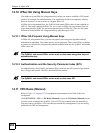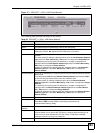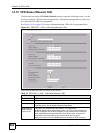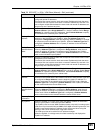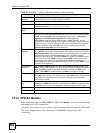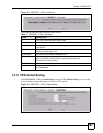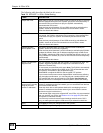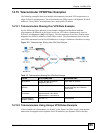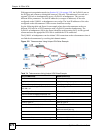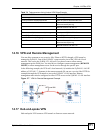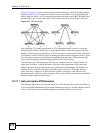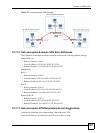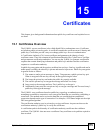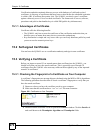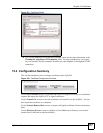
Chapter 14 IPSec VPN
ZyWALL 2 Plus User’s Guide
270
With aggressive negotiation mode (see Section 14.3.1.4 on page 242), the ZyWALL can use
the ID types and contents to distinguish between VPN rules. Telecommuters can each use a
separate VPN rule to simultaneously access a ZyWALL at headquarters. They can use
different IPSec parameters. The local IP addresses (or ranges of addresses) of the rules
configured on the ZyWALL at headquarters can overlap. The local IP addresses of the rules
configured on the telecommuters’ IPSec routers should not overlap.
See the following table and figure for an example where three telecommuters each use a
different VPN rule for a VPN connection with a ZyWALL located at headquarters. The
ZyWALL at headquarters (HQ in the figure) identifies each incoming SA by its ID type and
content and uses the appropriate VPN rule to establish the VPN connection.
The ZyWALL at headquarters can also initiate VPN connections to the telecommuters since it
can find the telecommuters by resolving their domain names.
Figure 176 Telecommuters Using Unique VPN Rules Example
Table 74 Telecommuters Using Unique VPN Rules Example
TELECOMMUTERS HEADQUARTERS
All Telecommuter Rules: All Headquarters Rules:
My ZyWALL 0.0.0.0 My ZyWALL: bigcompanyhq.com
Remote Gateway Address: bigcompanyhq.com Local Network - Single IP Address: 192.168.1.10
Remote Network - Single IP Address:
192.168.1.10
Local ID Type: E-mail
Peer ID Type: E-mail Local ID Content: bob@bigcompanyhq.com
Peer ID Content: bob@bigcompanyhq.com
Telecommuter A (telecommutera.dydns.org) Headquarters ZyWALL Rule 1:
Local ID Type: IP Peer ID Type: IP
Local ID Content: 192.168.2.12 Peer ID Content: 192.168.2.12
Local IP Address: 192.168.2.12 Remote Gateway Address:
telecommutera.dydns.org
Remote Address 192.168.2.12
Telecommuter B (telecommuterb.dydns.org) Headquarters ZyWALL Rule 2:



